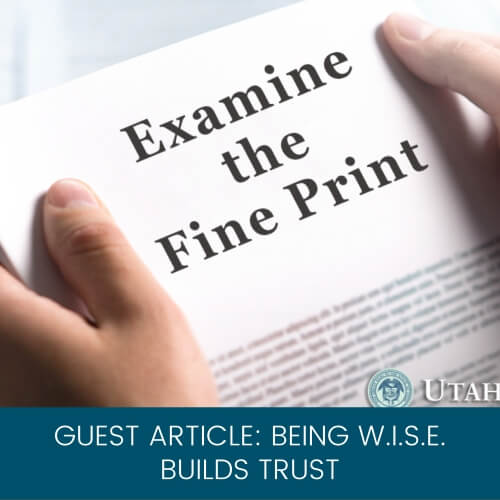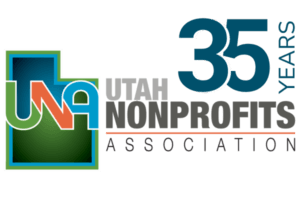 By Utah Division of Consumer Protection
By Utah Division of Consumer Protection
Without knowing you personally, I can’t say for sure what kind of person you are. Unfortunately, the same goes for your nonprofit organization. Consumers and potential donors have no shortage of options when deciding where they want to donate; and with the availability of crowdfunding websites and the accessibility of news online, it’s increasingly easy for scammers to exploit tragedies and peoples’ goodwill.
I’m willing to bet if you’re reading this then you’re probably one of the good guys. But how do you convey that to the public? Strengthening public trust in charitable giving is a large part of the mission at the Utah Division of Consumer Protection (“the Division”). One way the Division does that is by helping consumers be W.I.S.E when donating:
- W - Watch for Red Flags: High pressure tactics to donate, bad ratings from charity watchdog organizations, vague mission statements, and lack of transparency about what your donation goes to can be signals that this is the wrong move for you.
- I - Investigate and Research: The “Verify a Registration” tool on the Division’s website (dcp.utah.gov) can tell you if the charity is permitted to solicit donations in Utah, registered with the Utah Division of Consumer Protection, and how much of your donation actually goes to the cause. If you want more information, you can look to charity watchdog groups like Charity Navigator, Charity Watch, and Give.org to find what kind of reputation the organization has. Finally, you can ask the charity directly for additional information.
- S - Set Boundaries: Determine how much you’re comfortable donating. Donate in the manner you’re most comfortable. Using a credit card to donate online to a charity’s official website is a safe way to protect yourself from fraud.
- E - Examine the Fine Print: Make sure you understand the terms of contracts. Make certain you understand if you’re signing up for regular donations and act accordingly.
This valuable guide for consumers is something we also want nonprofits to understand. Fostering a culture of transparency and accountability in your organization only stands to grow that trust in Utah charitable activity the Division strives so hard to build. As you look over the W.I.S.E checklist, we at the Division urge you to consider how you can use these guides to be a more trustworthy institution:
- Evaluate your interactions with the public. How intensely do you pressure people to donate? Do you have honest answers to a potential donor’s questions?
- Encourage the public to do their own independent research. Use previously suggested charity watchdog groups to help honest, effective charities by letting them stand above bad ones.
- Respect peoples’ boundaries when it comes to giving. If their donation would be helpful at the moment, likely, it will be just as helpful after some time has passed; encourage potential donors to give on their own terms.
- Be transparent about everything that you can. Let donors know clearly what kind of donation they’re giving and what it will be used for. Be repetitive if you have to to ensure they understand the terms to which they’re agreeing.
The Division of Consumer Protection is dedicated to strengthening trust in Utah’s commercial activities, including nonprofit giving, through education and impartial enforcement. As we continue to serve that mission, we look forward to working with organizations across Utah to build trust in the nonprofit sector and encourage W.I.S.E donations.
If you have a question about charities or are concerned about the activities of a nonprofit in Utah, please reach out to the Division of Consumer Protection at dcp.utah.gov or call at (801) 530-6601.
